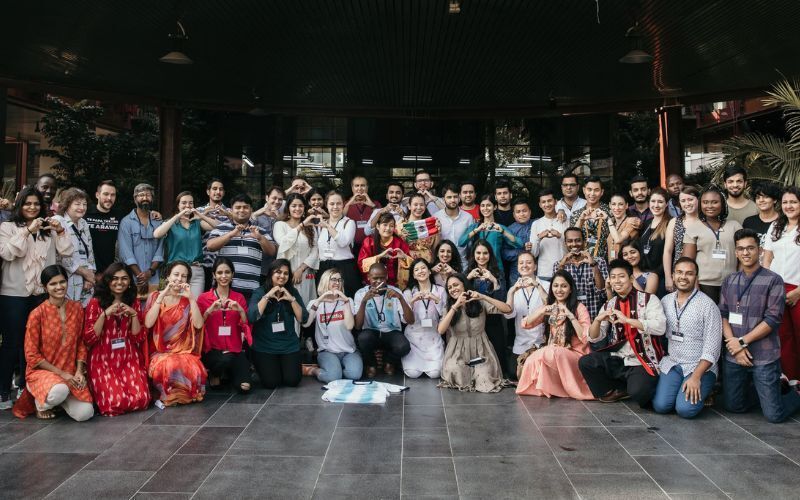Photo by UNESCO/MGIEP
Moving Beyond Tolerance: Racial Healing/Equity through Extended Compassionate Education
Starting in 2021, the Charter for Compassion (CFC) and Compassionate Integrity Training (CIT) are committed to working together to use compassion-based practices to amplify community dialogue, teach social-emotional skills, and reinforce interdependence while creating and expanding our networks, leading to racial healing and equity.
This part of our website presents materials that help define the issues of race, racism and racial healing. Use the right-hand side margin to link to articles, resources and an annotated bibliography that is informing our work and being offered as a guide to our members and partners involvement. We look to each of you who are involved in our work to contribute to these materials. If you have suggestions to incorporate to these materials, please contact us.
What do we want to do in our project?
Extended compassion is our bold idea. Extending compassion beyond in-groups is the healing antidote for racism. The Charter for Compassion (CFC) is one of the most important movements in the world and is endorsed by the Dalai Lama.
Self-interest, in-group bias, and lack of awareness of our common humanity and interdependence all contribute to racial injustice and inequity. CFC will expand its existing network of Compassionate Cities and deliver Compassionate Integrity Training (CIT), currently used by UNESCO-MGIEP and other organizations globally, to improve racial equity. CIT teaches common humanity, interdependence, and systems thinking skills to address self-interest, reduce in-group bias, increase compassion for self and others, foster positive peace that creates and sustains peaceful societies. CFC will engage civic, educational, business, youth, faith and grassroots organizations in processes that deepen connections and improve partnerships. These skills, stronger alliances, and increased compassion actively promote systemic changes and racial healing.
Why do we need to do this?
An absence of compassion can corrupt the decency of a community, a state, a nation.
~ Bryan Stevenson
Colonization has poisoned our global political history. Ownership and domination of people and nature have led to disenfranchised populations and left governments vulnerable to outside influence and pressure. Racial bias and inequity continue to be deeply ingrained within all levels of our global society. We have implicit, unconscious bias against certain races, which is expressed as inequalities and inequities in structural and cultural systems. This then directly affects educational, economic, social, and political systems, their outcomes, and diminishes extended compassion.
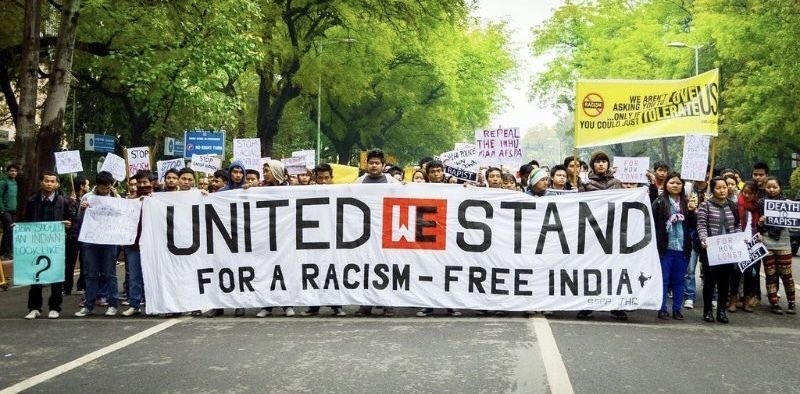
Photo by UNESCO/MGIEP
Our lack of compassion for those we deem different from us stems from in-group bias, not fully embodying our common humanity while not appreciating our interdependence. Common humanity is recognizing that humans have far more qualities in common than those that separate us. Interdependence is the reality that we are part of a vast ecosystem where each of us is dependent on others, institutions, and the environment to survive and thrive, and our actions similarly affect others. This lack of awareness exacerbates in-group bias and prevents us from engaging in significant civic engagement to overcome systems of injustice.
Most of us have not been trained in the skills of common humanity, interdependence, and compassionate systems thinking in order to reduce in-group bias, cultivate expanded compassion, challenge the status quo, and promote positive peace—the type of compassion embodied by figures such as Dr. Martin Luther King, Jr., Rigoberta Menchu, and Nelson Mandela.
Teaching extended compassion to heal ourselves and others, thereby transforming racist and unequal systems is our bold idea. Integral to our approach is recognizing common humanity, that all human beings are seeking and have the right to greater wellbeing and less suffering. Extended compassion, already central to Charter for Compassion (CFC) and CIT philosophies, will be the primary tool for education, training, and rehabilitation. Our project is in sync with WKKF commitments to racial equity and healing. Compassionate education exposes in-group bias, helps us better engage with others, elevates and amplifies authentic stories, offers tools that provide a new direction, and repositions us in a more diverse and inclusive global community. This approach realizes that the inequity of living in a racist society comes at an incalculable emotional, physical, psychological, social and economic cost. We enter this Project as interconnected allies with those working in our hubs and in local communities. Our approach: hold deep conversations, recruit local staff reflective of the communities they serve, uphold cultural appreciation, promote dialogue leading to realistic strategic plans that culminate in the dismantling of institutional racism. In addition, we will continue to identify and address racism within our organizations and ourselves.
How will we do this project?
Extended Compassion is our bold idea. To combat racial injustice, we must address conscious and unconscious attitudes, assumptions, and beliefs that enmesh structural inequities and racial violence. With the help of local communities, CFC and CIT will reimagine and restructure systems of racial injustice by targeting and changing these attitudes, assumptions and beliefs. We will teach skills of common humanity and interdependence to civic, business, educational, and grassroots organizations with CIT. We will then organize multi-sector groups of those trained in these skills to bring new attitudes and behaviors to their institutions and structures. This increased awareness, along with cultivated extended compassion, will compound, create and sustain racial equity and healing.
CIT teaches common humanity, interdependence, and compassionate systems thinking skills in order to reduce in-group bias, increase compassion for self and others, and foster positive peace.
CFC has been building a global network to cultivate these values for several years. Currently, that network includes over 400+ compassionate cities in 54 countries, and 2600+ partners. This project will establish Regional Hubs in existing CFC strongholds to focus on racial healing and equity. We will grow five hubs into fifteen before 2030.
Only a small number of people, less than 10%, need to shift away from systems of domination and control to systems of partnership and collaboration for meaningful change to happen rapidly according to the World Economic Forum. Engaged cities and CIT hold critical keys for unlocking viable and just solutions not currently found in racist thinking and present-day systems.
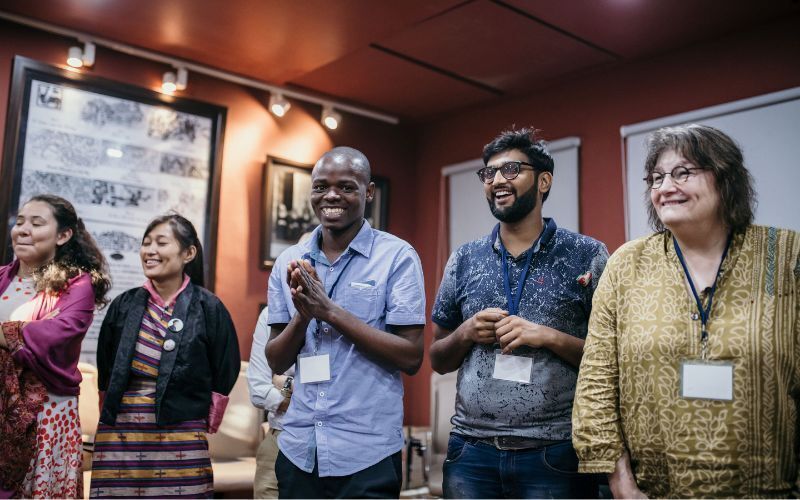
Photo: UNESCO/MGIEP
What are the beginning steps?
Change will only come with a clear understanding of the legacy caused by colonization, entitlement, self-interest and privilege. Eliminating racism starts with deep listening, recognizing our divisions, racial reconciliation, building on successes and reinventing our futures together. To move beyond tolerance, we will model our first 5 hubs on current work, CIT partnerships, conversations with youth globally, and ongoing meetings to address state-sanctioned violence.
Short-term Goals:
- Tweak CIT curriculum for increased focus on racial healing/equity ensuring accessibility for people with different abilities.
- Create 5 Regional Hubs and strengthen with community listening sessions, staffing and training, US-Southwest, Southeast, Midwest; South Asia and Latin America.
- Create and review metrics and evaluation processes to be used before, during, and after the project is started.
Intermediate Goals:
- Create and strengthen 5 new hubs in US/Canada-West Coast; Northeast; Eastern Europe, EU/UK, North Africa.
- Continue to measure and assess what is working and fix what is not.
Long-term Goals:
- Use successes of first 10 hubs to create 5 more in Australia; Middle East; Southeast Asia, South Africa, South America
- Continue to track, measure and evaluate the project.
- Ensure these hubs are self-sustaining and look for local and national partnerships to grow models that confront institutional racism.
How are we uniquely situated to do this project?
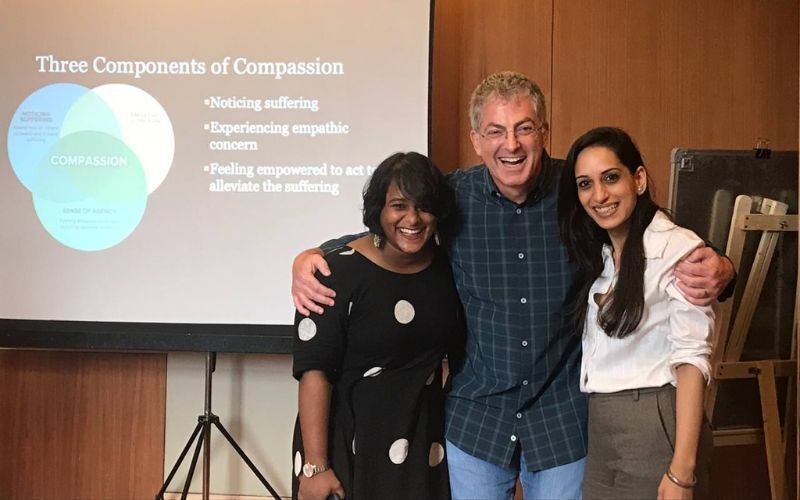
Photo by UNESCO/MGIEP
The Charter for Compassion (CFC) and CIT are grassroots organizations with extensive global networks, which makes community engagement critical to everything we do. CFC will work hand-in-hand with local community organizers, current volunteers, and other partners to bring together diverse people to work for solutions. The Charter will assist each community, ascertain their priorities, remove barriers to addressing racial issues, build compassionate initiatives and create new pathways to equity.
Initially, we will create dialogue, as Paulo Freire outlines in Pedagogy of the Oppressed, to understand the hindrances that work against liberation and to begin by recognizing instances of systemic racism. Then, with valued input directed by local communities, we will offer CIT to people in multiple sectors, evaluate our work, and adjust as needed according to metric indicators. Simultaneously, Charter for Compassion (CFC) and CIT will work to expand community trainers in existing hubs.
How is what we are doing different?
Our approach is uniquely different because we focus on root causes, rather than addressing symptoms. We endeavor to shift the false, deep-seated, narratives, beliefs, and assumptions we have about each other that feed in-group bias, support structures of oppression, and encourage direct, indirect and structural violence. We work to change these inaccurate views of others and ourselves through community engagement with CIT, restructuring existing conversations, and creating civic dialogue where there is none. Focusing on education and practice, we will shift mental models toward the reality of common humanity, interdependence, and extended compassion. Our solution involves working with a systems-thinking model to effect change that represents a more inclusive and accurate worldview. Our current model is scalable using existing community and civic networks to implement programs that encompass face-to-face, hybrid, and fully self-directed modes. Additionally, we are in the process of delivering this program in other languages and dialects.
How will we know that we are being successful?
We will define success in two ways:
Process Evaluation: The project is changing minds, opening hearts, and expanding compassion. Before, during, and after CIT courses, we will measure to see if a sense of common humanity has increased. We will also gather feedback from community groups and local partners to measure their sense of connection to each other and the larger community. A measurable greater sense of common humanity, increased connections, and acceptance of others will help to define success.
Outcome Evaluation: The project brings about racial healing and improves racial equity when people:
- Work for systemic change to assure equal access to healthcare, education, jobs, and opportunities.
- Demonstrate how systems can be engaged when confronting institutional racism.
- Appreciate cultural differences and treat one another with kindness and gratitude.
- Investigate and question political policies.
- Value interaction in the learning process.
- Find ways to promote and sustain the project.
What is our timeline and milestone?
The Charter for Compassion's global network of more than 400 Compassionate Cities, and 2600 partner organizations is constantly growing. CIT has a global reach, with 3,000+ graduates from 60 countries and 120+ certified facilitators in 15 countries. Charter for Compassion (CFC) offers CIT through its Education Institute and was instrumental in introducing CIT to UNESCO-MGIEP as their recommended program to teach social emotional learning and CIT is currently used to train youth (18-34) in dozens of countries throughout the world. UNESCO-MGIEP also selected CIT to integrate into their global program to prevent violent extremism in youth. Its focus on reduction of in-group bias and increase in common humanity are key factors in building racial healing and racial equity. In their 2020 Review of SEL for Education Systems, UNESCO-MGIEP found a reduction in measures of anger, depression, anxiety, social isolation, and an increase in emotional and social wellbeing for CIT learners.
General milestones of this project include strengthening structures of each Compassionate City, establishing personnel and grassroots teams, designing CIT offerings to meet needs of local communities, delivering and measuring CIT sessions, training facilitators, and creating a sustainability plan. Selected points include:
Years One-Three
- Establish five Regional Hubs: US-Southwest (San Antonio); Southeast (Atlanta); Midwest (Chicago); South Asia (New Delhi), and Latin America (Monterrey, Mexico)
- Staff each hub with a Coordinator and two Community Organizers
- Assess what is already happening within hubs and respond accordingly.
- Create/implement Program management framework.
- Ensure local teams are inclusive of multiple races and abilities.
- Support listening sessions and community building.
- Launch CIT courses in these 5 hubs, track progress, evaluate results.
- Ensure program is culturally sensitive with bias-free language; adjust as needed.
- Measure outcomes of trainings and engagements
- Spread model into other community sectors (healthcare, prisons, etc.)
- Evaluate and revise Project as needed before creating new hubs.
Years Four-Six
- Establish 5 more hubs: US/Canada-West Coast (California); Northeast (Boston); Eastern Europe (Sarajevo-Bosnia), EU/UK (Berlin), North Africa (Kenya)
- Repeat steps in first hubs and link up efforts in all cities.
- Fine-tune project model before creating next Hubs.
Years Seven-Nine
- Establish five new hubs: Australia (Ballarat); Middle East (Jordan); Southeast Asia (Jakarta), South Africa (Cape Town), and South America (Colombia)
- Repeat what’s successful while adjusting for new countries and cultures.
- Support the work in other 10 hubs and champion local and global networking.
- Continue to measure and evaluate the project.
- Secure funding to maintain and grow hubs.
How will we measure our results?
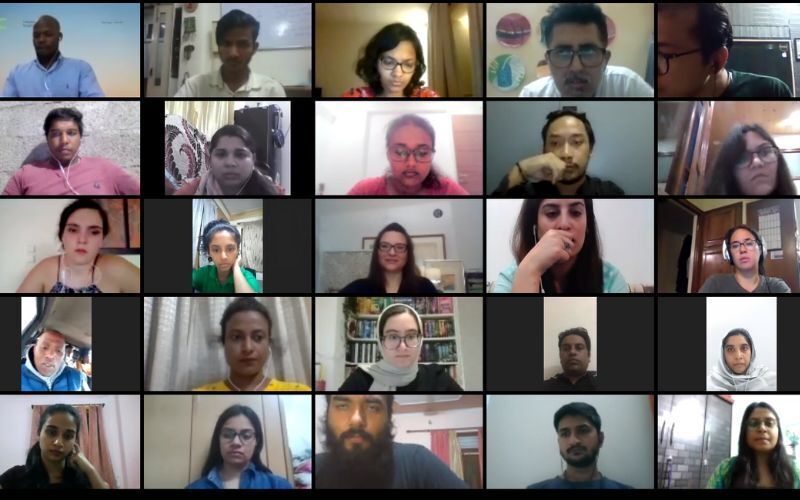
Photo by UNESCO/MGIEP
We will use several metrics, including participation and enrollment, to assess the effectiveness of the project. The first and most basic measure will be community engagement and local involvement. Second, success will be the number of people who complete CIT courses and the growth within hubs of facilitators.
Third, we will measure all increases in a sense of common humanity. We will use different validated, quantitative self-report measures, such as the Identification with All Humanity Scale, Global Social Identification Scale, the Psychological Sense of Global Community Scale, and the Global Citizenship Identification Scale. These measures will be administered to a statistically valid sample size within each population served at several key points, i.e., pre-intervention, post-intervention, and at six-month post-intervention intervals.
Lastly, every six months, we will conduct focus groups and semi-structured interviews with a sub-sample of participants around racial equity to gather qualitative data on the effects of the program. We will ask both broad and specific questions, such as “I feel committed to promoting racial equity,” “I feel committed to anti-racism,” as well as questions like “I feel I have the resources to engage in racial equity work,” “I feel like I can manage my emotions while engaging in racial equity work,” “I feel like I have resources for having difficult conversations,” “I feel like I have resources for understanding trauma related to racial equity issues,” “I feel like I have resources to think about the complexity of systemic racism.”
Our project is feasible because we have seen success working together for the past three years. We have made some inroads toward training volunteers in key cities and countries with a tiny budget and dedicated team. CIT has extended into several sectors and built an international cadre of CIT-trained educators. We have a solid model in place based upon our unprecedented rate of growth in the previous 18 months alone, paired with feedback from community leaders, national and international organizations.
Some barriers for us are not having dedicated, paid personnel in cities to network within their respective communities, as unpaid grassroots organizers have limitations. Our budget provides for compensating local personnel to minimize this problem.
We anticipate that as people become involved in taking responsibility for advancing racial equity and acquire the skills of CIT, more action will be asked of community leaders and will challenge the status quo.
What other things have we been thinking about?
Addressing racism and achieving racial healing requires a paradigm shift. We intend to counteract racial injustice and inequity with extended compassion and social-emotional learning. The project will extend the Compassionate Cities network of CFC and significantly expand CIT in geographic hubs to work with diverse voices within cities (organizers, planners, schools, youth, faith leaders, businesses, etc.) and to introduce tools to bring about systemic change tailored to the needs of each community. The Project will succeed in each locale because the community-led team will become an essential part of the work as they extend their skills to include the design and implementation of the Project in their own communities.
We acknowledge that our team has benefitted from privilege and systems of oppression that we have discussed in this proposal. We recognize we must continue our own work to unravel racism and secure racial equity and healing.

